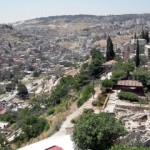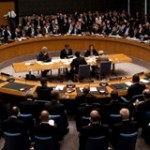
By Marney Blom
Splicing the landscape between the Muslim Arab Mount of Olives and the ramparts of the Old City walls of Jerusalem, lies a sweeping valley that descends 4000 feet along its 20-mile course to the Dead Sea. Many biblical scholars agree. This is the site mentioned in Scripture as the Valley of Jehosphat – “the valley of God’s judgment,” according to a direct Hebrew translation.
Today, as in biblical times, this gorge is called the Kidron Valley – a tranquil crevice pitted on either side by Jewish, Christian and Muslim holy sites. It is hard to imagine that one day, according to Scripture, this valley could witness the convergence of the world’s armies.
The truth is, Israel is already considered to be at odds with the rest of the world, particularly in the eyes of the United Nations Human Rights Council. According to Hillel Neuer, the executive director of UN Watch, “The focus on Israel remains excessive. … 80 percent of the council’s resolutions [are] against Israel. These resolutions are one-sided. [There are] only Israeli violations and there is no reference whatsoever to any other actor. There [are] no Arab states; there [are] no Palestinian groups; there is no Fatah; there [are] no Islamic jihads; there is no Iran; there is nobody. There [are] just Israeli violations.”
The UN, and a majority of nations, have officially adopted the two-state solution to peace and are willing to retract Israel’s borders by carving the high ground of Samaria and Judea out of the heartland of Israel. Most nations simply do not recognize Jerusalem as Israel’s capital and would applaud its conversion into an international city.
Rabbi Ken Spiro, the senior lecturer of Aish HaTorah, observes, “Jerusalem is so central to the Jewish people. We mention it 667 times in the Hebrew Bible. We say at every wedding, ‘If I forget thee oh Jerusalem, let my tongue cling to the roof of its mouth. If I don’t raise Jerusalem above all my joys.’ …It is absolutely in any future peace negotiations. It is one of those issues that you know there is nothing to talk about.”

Yet the nations continue to dialogue. The September 23rd, 2011 visit of the Palestinian Authority to the United Nations forced countries to expose their position on the Israel-Palestinian debate. At this point, a vote in favour of Palestinian statehood, despite its failure to honour the conditions of the Oslo Peace accords, is clearly a vote against Israel’s best interests.
For the citizens of Israel, this is of grave concern.
“From an Israeli point of view, it’s basically a very dangerous thing,” said David Weiss, an online financial service advisor from Tel Aviv. “From a Palestinian point of view, it’s a smart thing because the overwhelming majority of countries in the world will recognize a Palestinian State.”
“I think most of the world does not have a clue about what Abbas and the Palestinians and all the Arab nations are doing,” added Nancy Cooperstein, a teacher in Jerusalem. “They hate Jews … so how can anybody really negotiate with them?”
Today, 127 out of 194 U.N. member-states officially recognize Palestine as a state and regard division of Israel’s land as the only solution to peace. Yet, a remnant from within these nations continues to come to Jerusalem yearly to demonstrate solidarity with the land and the people of Israel. These are evangelical Christians and they know the prophetic scriptures. They pray that their nations will hang favourably in the balance, on side with Israel on the day of Judgment, in the valley of decision.
Marney Blom is the news director for the Acts News Network.
Copyright © Acts News Network, Inc.
